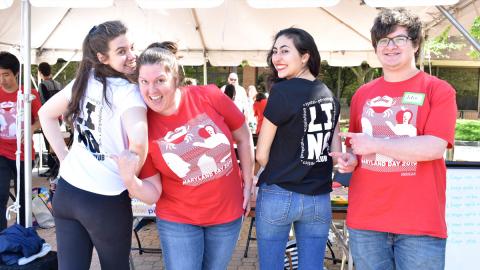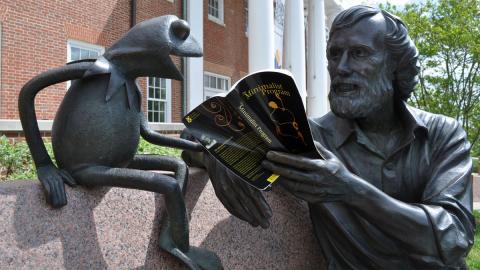Undergraduate Program
The Department of Linguistics undergraduate program seeks to expose majors to fundamental questions about the nature of the human mind, using language as a vehicle for examining this issue.
Human beings share a capacity for language, unique to the species. This capacity guides the learning of language in children and constrains the character of the languages we come to have. To study it we pursue various sources of evidence. Among them are the grammars of individual languages; patterns of grammatical variation across languages; the development, normal and abnormal, of language in children; the mental processing of language in use; and the embodiment of language in the brain. But all these perspectives converge on a single natural object: the human language faculty, whose study unifies the work at Maryland Linguistics.
Studying linguistics at Maryland
Information on admission to the University of Maryland is here. General information about undergraduate studies is available in the: Undergraduate Catalogue.

Major in Linguistics
The Bachelor of Arts (B.A.) with a major in linguistics is designed to provide undergraduate students with a solid foundation in current theoretical research and state-of-the-art experimental research.
Learn about the Major
Minor in Linguistics
The Bachelor of Arts (B.A.) with a major in linguistics is designed to provide undergraduate students with a solid foundation in current theoretical research and state-of-the-art experimental research.
Learn about the minorUndergraduate advisors
Peggy Antonisse
Senior Lecturer, Linguistics
Member, Maryland Language Science Center
1413 Marie Mount Hall
College Park
MD,
20742
Tonia Bleam
Senior Lecturer, Director of Undergrad. Studies , Linguistics
Member, Maryland Language Science Center
1401 E Marie Mount Hall
College Park
MD,
20742
Advising Appointments
The undergraduate advisor for the linguistics major is Tonia Bleam. The advisor for the linguistics minor is Peggy Antonisse; Antonisse can also provide advising for the major. The best way to contact your advisors is by email.
When you email your advisor to set up a meeting, make sure to include in your email a list of your available dates and times for the entire week (that is, the five weekdays following the day you send your message). If you have sent an email and haven't heard back in two days, please send another email.
In order to make an appointment with your linguistics advisor, send her an email with your name, UID #, the reason for the appointment and a list of your available times during the week. Do not give just one specific time or day when you are available, because it is likely that the advisor will be unavailable at that time, which will result in more email back and forths. Please remember that your professors' time is limited and make the process as streamlined as possible
For more information on College of Arts and Humanities requirements, visit the ARHU advising page.
Research Opportunities
The department welcomes undergraduate participation in faculty research. This kind of research experience is especially valuable for students planning to go to graduate school. The participation can also lead to a departmental honors project for linguistics majors.
Students can become involved in a wide range of activities, including computer programming and experimental projects in language acquisition, psycholinguistics and neurolinguistics. Undergraduate students have worked alongside faculty and graduate students—learning to design, execute and analyze experiments—within our Acquisition Lab and our Cognitive Neuroscience of Language Laboratory.
Students can receive course credit—through LING 499, “Directed Studies in Linguistics”—to work as a research assistant, working closely with one or more mentors (faculty members, graduate students, postdoctoral researchers) and as part of a research team. In addition to learning research methodologies and implementing various aspects of running experiments (running subjects, coding data, etc), students read articles and participate in lab meetings and discussions to learn about the theoretical questions that motivate the research they are doing. The time commitment will be a total of 8 or 12 hours per week, for 2 or 3 credits, respectively. Some labs require a commitment of 3 credits per semester and/or a 2 semester minimum commitment.
To apply for a research position, schedule an interview by contacting the faculty member (or lab manager) in whose research you are interested. The acquisition lab has an informative page about working in the lab here. Be prepared to send a resume, your unofficial transcript, the name of a reference, as well as your next semester’s schedule.
The Baggett Summer Scholarship provides a special opportunity for in-depth research experience during the summer (for pay), under the close guidance of a faculty mentor.
Further opportunities for beyond-the-classroom experience can be found in the President's Promise Initiative. This is a "virtual library" of special undergraduate experiences that includes international experiences, internships, living-learning programs, research opportunities, community service learning, leadership experiences and much else. The President's Promise office staff can also be reached at presidentspromise@umd.edu or by telephone at 301-314-7888.
After graduation?
Our students have gone on to some of the most prestigious graduate programs in linguistics and cognitive science, such as MIT, Stanford, Cornell and the University of Pennsylvania. Students who combine linguistics with computer science have been hired in high-tech jobs. Students who combine linguistics with the study of a language have gone on to teach languages and work as translators. Many of our students have studied linguistics just for their own interest and have gone on to successful careers in unrelated subjects, including being admitted to prestigious law and medical schools. Study of linguistics develops not only a sensitivity to language, but a scientific approach and keen skills of analysis that are valued by knowledgeable employers in many professions.
Undergraduate Mailing List
Linguistics has a mailing list for undergraduates. If you're a linguistics major, you should make sure to be on the list. If you don't, you're going to miss important announcements. To subscribe, unsubscribe or post to the list, visit the link below.

